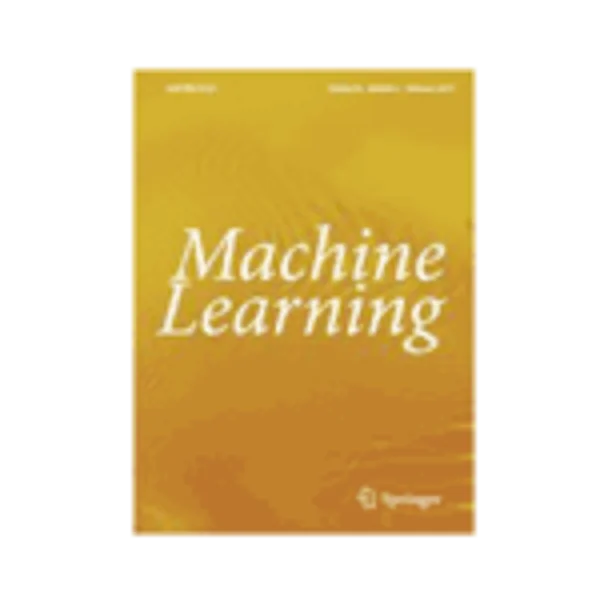-
learning compact markov logic networks with decision trees
جزئیات بیشتر مقاله- تاریخ ارائه: 1392/07/24
- تاریخ انتشار در تی پی بین: 1392/07/24
- تعداد بازدید: 921
- تعداد پرسش و پاسخ ها: 0
- شماره تماس دبیرخانه رویداد: -
statistical-relational learning combines logical syntax with probabilistic methods. markov logic networks (mlns) are a prominent model class that generalizes both first-order logic and undirected graphical models (markov networks). the qualitative component of an mln is a set of clauses and the quantitative component is a set of clause weights. generative mlns model the joint distribution of relationships and attributes. a state-of-the-art structure learning method is the moralization approach: learn a set of directed horn clauses, then convert them to conjunctions to obtain mln clauses. the directed clauses are learned using bayes net methods. the moralization approach takes advantage of the high-quality inference algorithms for mlns and their ability to handle cyclic dependencies. a weakness of moralization is that it leads to an unnecessarily large number of clauses. in this paper we show that using decision trees to represent conditional probabilities in the bayes net is an effective remedy that leads to much more compact mln structures. in experiments on benchmark datasets, the decision trees reduce the number of clauses in the moralized mln by a factor of 5–25, depending on the dataset. the accuracy of predictions is competitive with the models obtained by standard moralization, and in many cases superior.
مقالات جدیدترین رویدادها
-
استفاده از تحلیل اهمیت-عملکرد در ارائه الگوی مدیریت خلاقیت سازمانی و ارائه راهکار جهت بهبود
-
بررسی تاثیر ارزش وجوه نقد مازاد بر ساختار سرمایه شرکت های پذیرفته شده در بورس اوراق بهادار تهران
-
بررسی تأثیر سطح افشای ریسک بر قرارداد بدهی شرکت های پذیرفته شده در بورس اوراق بهادار تهران
-
بررسی تأثیر رتبه بندی اعتباری مبتنی بر مدل امتیاز بازار نوظهور بر نقد شوندگی سهام با تأکید بر خصوصی سازی شرکت ها
-
تأثیر آمیخته بازاریابی پوشاک ایرانی بر تصویر ذهنی مشتری پوشاک ایرانی (هاکوپیان)
-
بررسی اثر گسترش جانبی ناشی از روانگرایی بر لوله های مدفون طولی با استفاده از آزمایش های میزلرزه 1g
-
جایگاه دانشگاه فرهنگیان و تأمین منابع انسانی در سند تحول بنیادین آموزش و پرورش
-
پتانسیل خوردگی و رسوب گذاری آب آشامیدنی در سیستم های آب رسانی مراکز نظامی
-
بهینه مقاومت مشخصه جداگرهای لاستیکی – سربی در ساختمانهای بتنی تحت تحریکات نزدیک گسل
-
evaluation of temperature effect on growth rate of lactobacillus rhamnosus gg in milk using secondary models
مقالات جدیدترین ژورنال ها
-
مدیریت و بررسی افسردگی دانش آموزان دختر مقطع متوسطه دوم در دروان کرونا در شهرستان دزفول
-
مدیریت و بررسی خرد سیاسی در اندیشه ی فردوسی در ادب ایران
-
واکاوی و مدیریت توصیفی قلمدان(جاکلیدی)ضریح در موزه آستان قدس رضوی
-
بررسی تاثیر خلاقیت، دانش و انگیزه کارکنان بر پیشنهادات نوآورانه کارکنان ( مورد مطالعه: هتل های 3 و 4 ستاره استان کرمان)
-
بررسی تاثیر کیفیت سیستم های اطلاعاتی بر تصمیم گیری موفق در شرکتهای تولیدی استان اصفهان (مورد مطالعه: مدیران شرکتهای تولیدی استان اصفهان)
-
مروری بر بازاریابی دیجیتال و ابعاد آن از دیروز تا امروز
-
ارائه الگوی سرمایه اجتماعی کارآفرینانه با تاکید بر مسئولیت اجتماعی سازمان تامین اجتماعی استان گلستان
-
استفاده از شبکه های اجتماعی و ارتباط آن با سبک های هویتی و گرایش به رفتارهای پر خطر در دانش آموزان دبیرستان های شهرستان سراوان
-
شناسایی علت های تاثیرگذار خوردگی میلگرد فولادی در بتن آرمه و بررسی روش های مکانیکی مستقیم حفاظت از آن
-
بررسی تاثیر عوامل موثر بر تمایل کاربران به خرید اپلیکیشن های کاربردی




سوال خود را در مورد این مقاله مطرح نمایید :